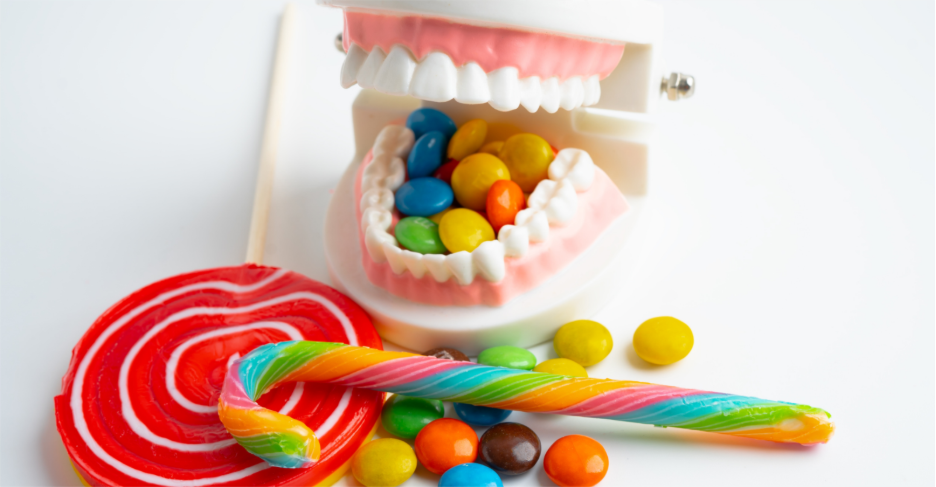

Whether it's a bite of birthday cake or a favorite chewy candy, sweets are meant to bring joy. But if every sugary treat is followed by a sharp twinge in your teeth, you're not alone. Many patients come to us asking the same question: Why do my teeth hurt when I eat sugar?
In this blog, we'll break down the science behind tooth pain when eating sweets, the most common causes, and what you can do to relieve discomfort and prevent future issues. If you’ve ever thought my teeth hurt when I eat sweets, this guide is for you.
To understand this discomfort, let’s look at what happens when sugar touches your teeth. Normally, your enamel acts as a protective barrier. But when enamel wears down or decay is present, that protection weakens. Sugar can then reach the sensitive inner layers of your teeth, causing pain or discomfort.
There are several key reasons your tooth hurts when eating sweets:
Enamel protects your teeth, but it can wear down over time. Acidic foods, aggressive brushing, and grinding can cause enamel to erode. Underneath that enamel is dentin, a porous material that connects to the nerves inside your tooth. When dentin is exposed, sugar and other triggers can create a sharp, uncomfortable sensation. This is a common reason why your teeth hurt after eating sugary foods.
Sugar feeds the bacteria in your mouth, which then produce acid that attacks your enamel. If this continues, cavities can form. Even early-stage cavities can cause sensitivity. When you eat something sweet, it can seep into these decayed areas, triggering pain. If you’re asking why does candy make my teeth hurt, this may be your answer.
When your gums recede, they expose the roots of your teeth, which are not covered by enamel. These root surfaces are especially sensitive to temperature changes, pressure, and sugar. Gum recession is often caused by brushing too hard, gum disease, or grinding your teeth. If you experience pain localized near the gumline, this could be why sugar hurts your teeth.
Bruxism, or teeth grinding, wears down the enamel and can cause small cracks or fractures. These damaged areas make it easier for sugar to irritate the inner layers of your teeth. Even if you don't notice the grinding, symptoms like morning headaches or jaw pain may point to this issue.
Fillings, crowns, or veneers that are worn or poorly sealed can allow sugar to sneak in between your natural tooth and the restoration. This can lead to decay underneath the surface, causing sensitivity when exposed to sweets.
Sugar doesn’t just sit on your teeth. It reacts with plaque and bacteria to create acid. This acid softens enamel and irritates the dentin. Other foods might be hot or cold, but sugar starts a chemical reaction that can be particularly irritating if your teeth are already compromised.
If your tooth hurts when you eat sweets, the good news is that there are practical steps you can take to reduce pain and protect your smile.

Brushing with a fluoride toothpaste can help remineralize enamel. Use a soft-bristled toothbrush and avoid over-brushing. Floss daily to remove plaque and sugar from between teeth where decay often starts. A desensitizing toothpaste can help block the sensation from reaching the nerves inside your teeth.
The more often your teeth are exposed to sugar, the more chances bacteria have to produce harmful acid. Limit snacking between meals, and try to consume sweets with meals when your mouth produces more saliva to neutralize acid.
Rinsing your mouth with water after eating sugary foods can help wash away sugar and acids, offering some immediate relief and long-term benefit.
Caramels, gummies, and hard candies that sit in the mouth for long periods are especially damaging. Choose options that don’t stick or linger, and rinse your mouth when you're done.
If your teeth hurt when eating sweets, it could be a sign of enamel erosion, gum issues, or cavities. A dental exam will help identify any conditions that require treatment. Restorations, sealants, or fluoride applications may be recommended based on your specific needs.
Tooth pain after eating sugary foods is not something you should ignore. Even if the discomfort is mild or comes and goes, it may signal a bigger issue. Our team at Tribeca North Dentistry can help you get to the root cause of the problem and offer personalized solutions.
If you’re grinding your teeth, dealing with early-stage decay, or experiencing gum recession, we can address it before it worsens. Protecting your enamel and managing sensitivity now means fewer issues down the road.
Related Blog: Considering a Whiter Smile?
If sensitivity has you concerned but you’re also interested in cosmetic care, check out our post: Top 5 Reasons to Choose Professional Teeth Whitening: Achieve a Brighter Smile with Expert Care
You shouldn't have to choose between enjoying a sweet treat and feeling pain. If you've ever wondered why does sugar hurt my teeth or why your tooth hurts after eating candy, it's time to take action.
At Tribeca North Dentistry, we help families across New York maintain healthy, comfortable smiles through expert care and education. Whether it’s a small cavity, sensitivity, or enamel concerns, our team is here to help with answers, relief, and long-term prevention.
Schedule your visit today and let us help you enjoy sweets without the sting. Book an appointment at one of our New York locations!